Some people say certificates and exams are not necessary for those who really know their stuff. I will address it later on but I want to start with sharing my experience on Kubernetes certification after I recently passed 5 exams and got awarded with the Kubestronaut title.
I decided to share my thoughts and tips on the process to help anyone thinking of taking an official Kubernetes exam and getting a certificate.
If you’re looking for technical tips I will share them in the next article. I am also not going to describe particular exams’ content because I just can’t - I’ve explicitly promised that to the Linux Foundation by acknowledging at the beginning of each exam and I always keep my promises. Even if I did, it wouldn’t be much help as the exams are practical and require from users both theoretical knowledge and its very quick application to a live environment.
Official certificates for Kubernetes practitioners
There are 5 exams and official Kubernetes certificates available from the Linux Foundation.
KCNA and KCSA are question-based exams that require theoretical, but surprisingly also practical, knowledge of Kubernetes. These are introductory exams, and in my opinion, they can be brute forced, especially for the practical skills that you might miss if you haven’t worked with a Kubernetes cluster.
I wouldn’t say they are trivial though. I was surprised to find really interesting questions that made me investigate particular topics after my exams.
I’m happy that KCSA includes best practices on security and the required knowledge in most cases isn’t tied to any specific solution or even a project.
Then there are 3 practical exams: CKAD, CKA, and CKS. Let me share my impressions on who should consider taking them based on the type of tasks I have seen on my exams.
Let’s start with CKAD. As the name suggests it is recommended for developers who work with Kubernetes environments. I totally agree and I think that this might be your first choice, regardless of your role.
I find that exam the most generic one that verifies your skills on managing containerized applications on any Kubernetes-based platform.
The next is CKA. In my opinion it is mostly for DevOps or Ops guys. If you haven’t worked with the control plane part of a Kubernetes cluster, haven’t done any upgrades or haven’t set up a cluster from scratch using kubeadm then this might not be for you. It’s a bit harder than CKAD and requires more knowledge on Kubernetes internals, especially the aforementioned control plane components. In my opinion it requires proficiency in Linux as well, so that’s why I think it’s a bit harder and not for everyone.
The last one is CKS. Again, as the name suggests, it’s for people who are taking care of the security of platforms using Kubernetes and containers. Because of the content I suggest this exam to be considered as a mandatory addon to CKA.
I would also recommend it for developers, but in my opinion some internals could be too overwhelming for those without much experience in Linux environments.
Security is everyone’s job and because CKS requires Knowledge on securing and hardening your Kubernetes platform I strongly suggest at least one person in your organization has the knowledge required by the exam or the certification itself.
I cannot imagine a production environment managed by a team without deep dive knowledge on at least RBAC and hardening the control plane components.
How I got my Kubestronaut title
All the requirements are listed on the official site of the program. Like I mentioned before I had to sit and pass all the five exams.
I’ve been providing Kubernetes training for the last 8 years and I’ve been helping various companies in the implementation of the Kubernetes or OpenShift in the environments. Based on my experience and to also challenge myself a bit, I decided to sit all 5 exams in 5 days.
I scheduled both KCNA and KCSA exams for the same day as I thought they would be easy to pass and wouldn’t require too much effort from me.
And indeed, I passed them quickly and moved on to my first practical exam - CKA. I chose it because it’s a prerequisite for the CKS exam and I couldn’t even schedule it without passing CKA first.
And so I did. I didn’t prepare that much and it was a real fun getting my hands on the exam tasks.
The next day I sat the CKAD exam and it also went smoothly for me which made me think that the last exam wouldn’t be much of a challenge either. And oh boy, was I wrong!
On the last, fourth day I sat the famous CKS exam and that was something quite surprising for me. I cannot reveal any details other than the fact that I simply failed this exam - I was 2% short of passing.
And so my ambitious, maybe even crazy plan fell apart. Because of the delay (results are sent in 24 hours which in my case was almost always at least 20 hours) I was able to schedule a retake two days after. Initially I wanted to take it on Sunday but then I thought it’s just a really stupid idea and I better get myself a proper break.
So finally I managed to pass the CKS exam on my second attempt with the average score above 90% of all the exams (excluding the failed one).
Would I do it again? Of course! Sometimes you need to challenge yourself to focus and find that motivation you haven’t felt for a long time. And that was my case and as a learner I’m going to use that approach in the future for similar scenarios as well. Of course I will share my thoughts and experiences in the form of similar articles or posts on my social media to encourage others.
Which Kubernetes exam is the easiest to take
Both KCNA and KCSA are quite easy, but they are the introductory level and question based. They are also not well recognized in the community and I guess it was an idea of the creators of the kubestronaut program to include them for a smooth start and some kind of encouragement.
When it comes to “real” exams CKAD is the easiest one in my opinion. It’s not the trivial one of course, but if you’ve been working with Kubernetes for a year or so, with some practice you may take the exam and even pass it on the first attempt.
Which Kubernetes exam is the hardest to take
CKS. Period. This one might really surprise you. At least it did in my case.
Even if you take the simulation exam available on the killer.sh platform (provided free by the Linux Foundation when you purchase the exam), you may be surprised, as I was, to find that in this particular case, the real exam is actually harder than the simulation.
But hey - it’s a great opportunity to learn and be one of those who managed to tackle all the difficulties of the exam, as most would probably just stick with CKAD or CKA.
My perspective on taking all 5 exams and receiving the Kubestronaut title
Let me start with my perspective, because for me, taking these exams brought me a lot of joy and excitement. I got it from the whole process of preparing, setting myself this crazy challenge, reviewing and improving my knowledge, but also from sharing my experience and giving my support to others.
With over 8 years of experience using and teaching Kubernetes, I have to admit that I thought I knew it all. Yes, this may sound like my ego needed a confrontation with reality, and that’s why I’m glad I failed my CKS. Maybe it wasn’t a wake-up call (after all I was 2% short from passing) but I found it a precious lesson I had to take and indeed I did.
I took the opportunity to review some elements and specific components in more detail, and most importantly, I practiced more to be as fast as possible. More on the importance of this in my tips article.
If you want to join the Kubestronaut program like me, you get your own jacket with the logo on it, which probably isn’t the benefit that is comparable to other programs like MVP from Microsoft or AWS Hero from Amazon.
I haven’t received my gift yet, but I already got a 50% discount on the next exams, and I can get a 25% discount (20% starting next year) on KubeCon and other events.
So if you decide to take all 5 exams don’t count for some exciting, tangible benefits. You probably want to do it for other reasons.
Is it worth getting certified
I have noticed there are generally two groups of people.
The first group thinks that certification is lame and redundant these days. They say that these certificates give you nothing and don’t really measure the knowledge or the skills of particular technology.
The second group believes that getting some certificate will automatically make you an expert, bump your salary and make others look up to you boosting your ego.
As always, the truth lies somewhere between. As a holder of many certificates I must admit that the value of a particular certificate depends on many factors.
The second group believes that getting some certificate will automatically make you an expert, bump your salary and make others look up to you boosting your ego.
As always, the truth lies somewhere between. As a holder of many certificates I must admit that the value of a particular certificate depends on many factors.
The most important are the following three:
- Recognition and credibility of the issuing authority - that’s why even the best certification program is worthless when created by unknown organization
- Demand for knowledge covered by the certification - no one cares if you get a certificate on a niche technology
- Difficulty level of the exams - does the exam really check the knowledge and confirms the skills
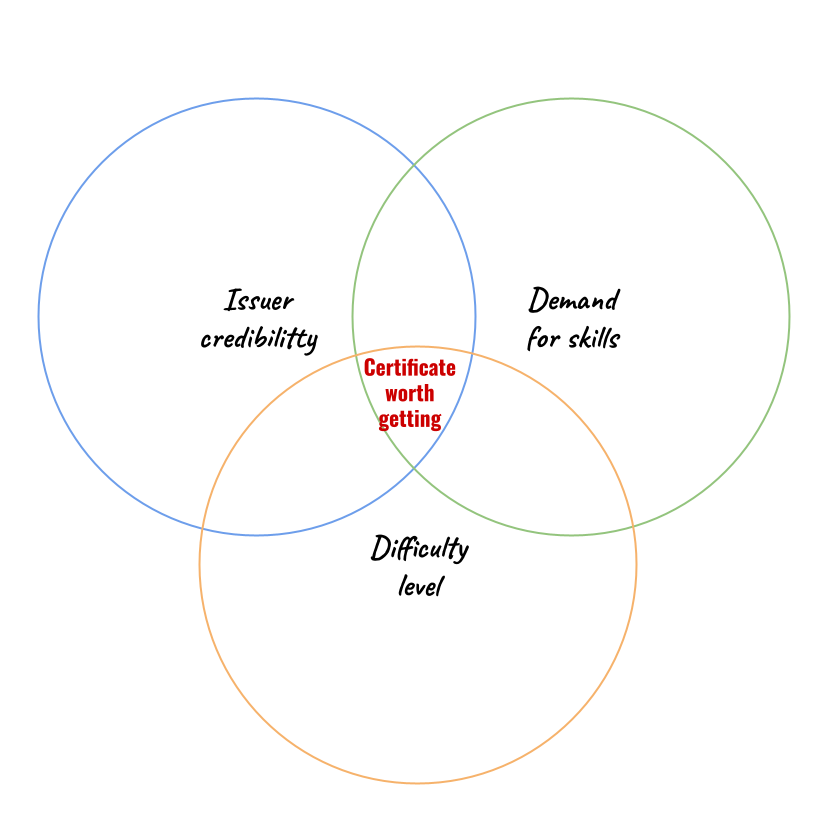 Three factors of a successful certification program
Three factors of a successful certification program
In the case of the official Kubernetes certification program all of the above requirements are met and that’s why I believe It’s worth considering proving yourself and your knowledge with all or only a chosen certificate from the official Kubernetes certification program portfolio.
Skills confirmation
One of the major factors is the fact that getting an official Kubernetes certification really confirms your skills. It’s all because the three main exams are task based and you just can’t cheat on them. Even if you could, it is just hard because of the time restriction and the number of tasks you are given.
Don’t let anyone tell you that passing any of these exams (especially CKS) is trivial, because it simply isn’t. You can prove your skills in many ways and sometimes certificates are the most universal way.
And often those who are the loudest critics of certification are probably the most afraid of a potential failure that could destroy their carefully crafted image as an expert.
By taking an exam, and even failing it, as I did, you step into the proverbial ring and prove yourself against time, perhaps against your own fears, insecurities, and doubts. It’s one of those things that makes an expert, and you can’t just skip it.
Increase self-confidence
You might take an exam to boost your self-confidence. We are all affected by imposter syndrome, and having a proof of your skills can help you deal with it. This might be an underappreciated benefit of the certification process and I believe many of the folks have been thinking about it because they want to get that confidence.
And that’s okay. I remember getting my Red Hat certifications (I took at least 8 practical exams) a long, long time ago because I wasn’t confident in my skills. At the time, it helped me advance my career as a result of my increased confidence and other skills I had built on top of it. It was a rough path at times, but it allowed me to gain more skills compared to the requirements of the jobs I had.
Find motivation
That’s very important. I see many people struggling with motivation for learning new things. You probably know how important goals are and setting them helps you achieve more.
A certificate can be that tangible result of your learning and overall progress. This can really boost your morale during the journey of learning, sometimes failing, doubts and times of crisis.
I always recommend getting a certificate for those who don’t know what to learn. The role of certification is also to guide and show the most important parts of the technology or a product.
And often, learning the parts specified by the exam will lead you through other dependent and related areas.
So certifications can be a really useful learning tool with a reward at the end. If used wisely, it can be a great motivator for many.
Conclusion
When it comes to certifications, it’s important to remember that not all of them are worth pursuing, and Kubernetes certificates aren’t the easiest to get. However, the whole process of learning and practicing is very satisfying - especially after you receive the email confirming that you’ve passed the exam.
Recently I got a survey request from the Kubernetes and Kubestronaut certification program manager with questions on whether the certificates help to get a job. I can’t say that they do, because the demand for skills is still quite high and you can certainly get hired without them, but I do believe that passing these exams (especially CKS) proves your skills and thorough understanding of Kubernetes.
Having them in your head prepares you even better for designing and managing efficient platforms for all kinds of workloads running on any kind of environment (on-prem, cloud, hybrid, IoT etc.).
So yes - I think it’s worth it if you want to verify your skills and learn even more about Kubernetes.

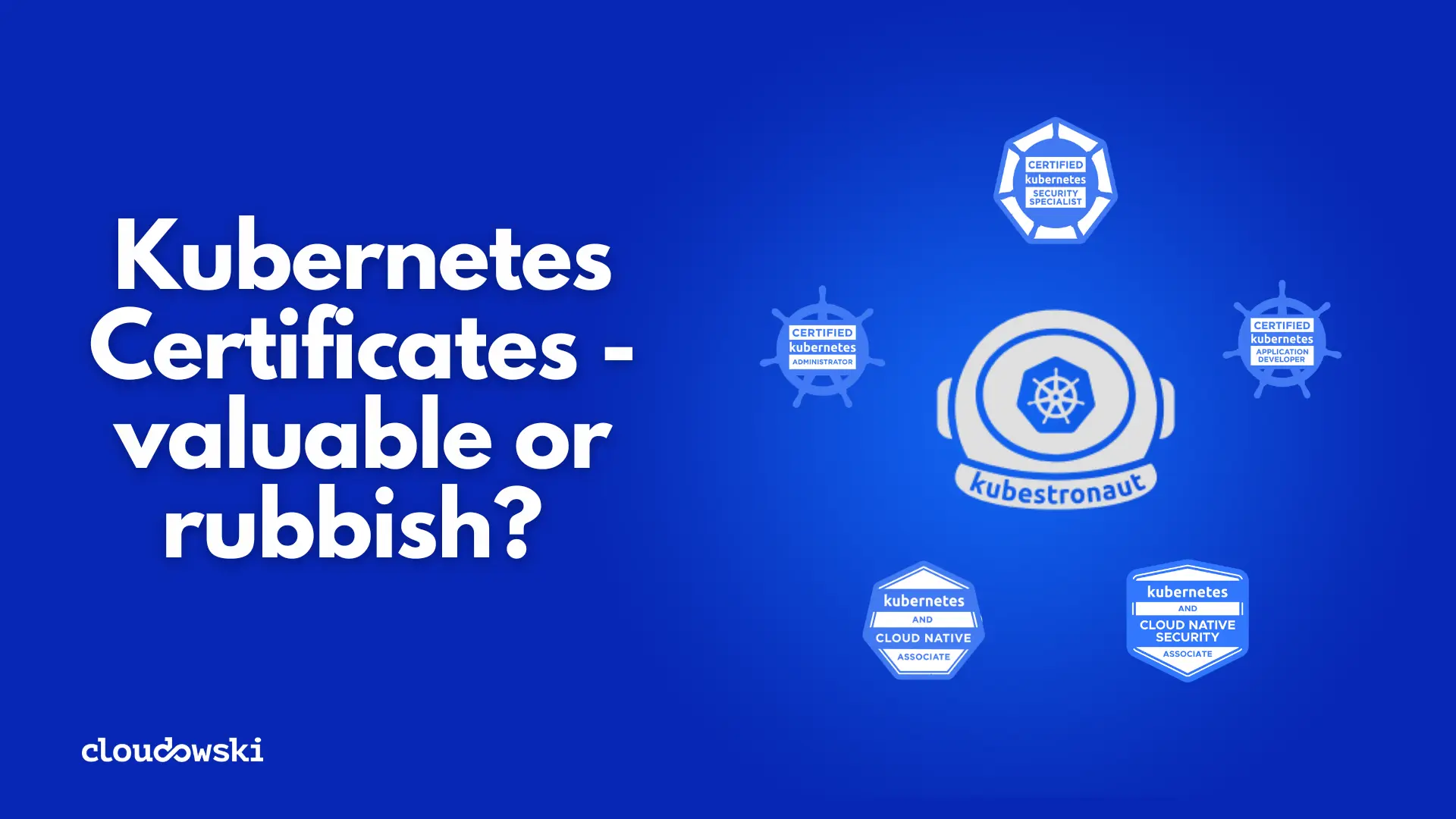
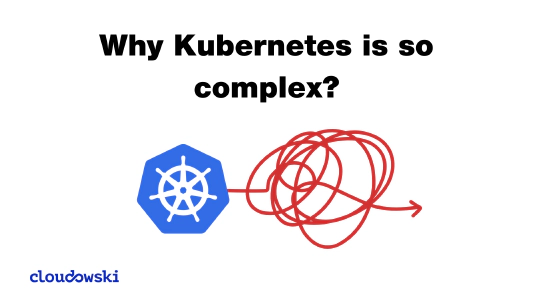
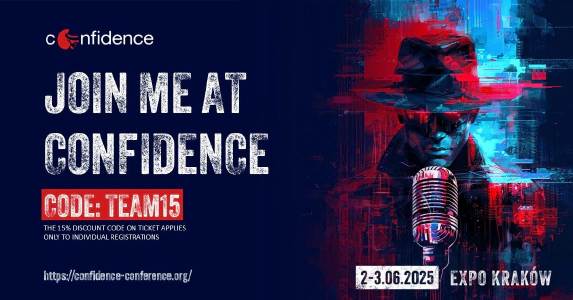
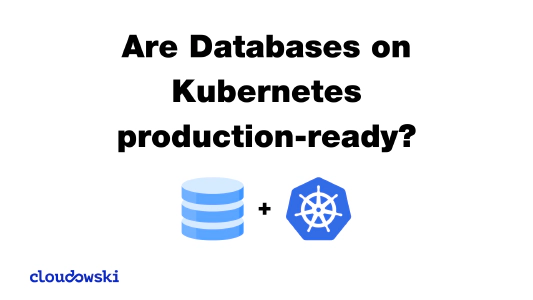

Comments